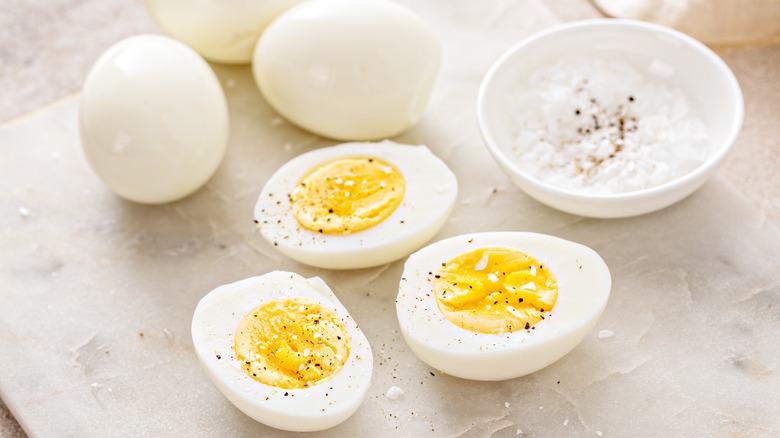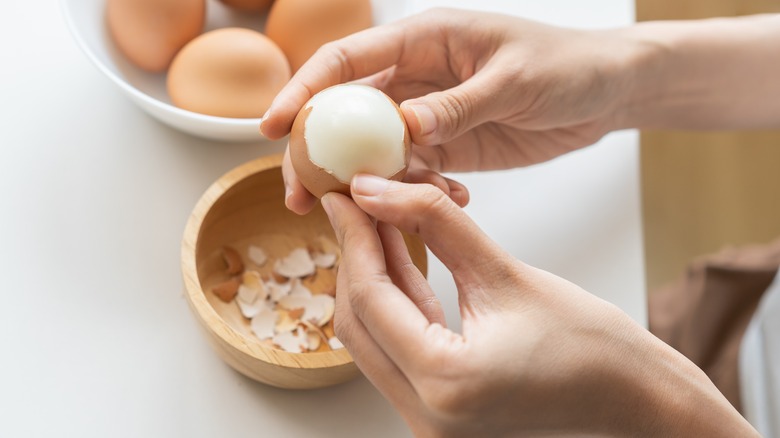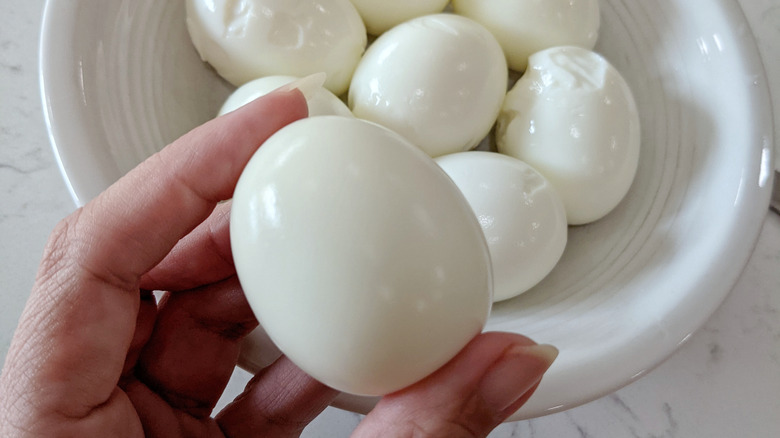Does Vinegar Really Make Peeling Hard Boiled Eggs Easier?
Of all the different ways eggs can be prepared (scrambled, over easy, poached, etc.), hard-boiled is arguably the most underappreciated mode of preparation. You aren't as likely to see them on the breakfast table as often as you might find omelets, eggs benedict, or even coddled eggs. Granted, the bags of pre-boiled eggs sold in grocery stores usually bring to mind quick, healthy, high-protein snacks rather than a substantial, warm breakfast meal. However, hard-boiled eggs are quite versatile when used as the base for a creamy egg salad or as deviled eggs — a classic party snack. The dreaded preparation is the only thing keeping you from all the variety of ways to use hard-boiled eggs.
And yet, there are a surprising number of complications to keep in mind when making hard-boiled eggs: Whether to start them in cold water or boiling water, avoiding the unsightly green ring around the yolks, and the trying task of peeling your hard-boiled eggs without the shells sticking and tearing up the delicate egg white. Apparently, if you want to make the shells softer and easier to peel, you can add things like salt, baking powder, or vinegar to the water. But do any of these hacks really work? I tested a few out and discovered that vinegar was the best addition for smooth, easy-peel eggs.
The hardboiled egg peeling experiment
For a home test on what made the eggs the easiest to peel, I boiled four eggs in different pots of water. One pot included 1 teaspoon of vinegar, one pot had ½ teaspoon of salt, one had 1 teaspoon of baking soda, and one pot was left plain as the control category. Otherwise, everything was treated the same.
I brought each pot to a boil and carefully dropped the eggs in the water, ensuring they were all fully submerged. I then set a timer for 9 minutes so they would all cook for the same amount of time, shooting for a mostly cooked yolk without becoming chalky — like how an egg cooker manages to be the laziest and best way to make hardboiled eggs.
When the eggs were done boiling, I placed each of them in an ice bath to halt the cooking immediately. I then went on to peel them while they were submerged in the bath, which let water come between the shell and the egg to help naturally loosen the shells. I was surprised to find that out of all the options, vinegar did truly help to peel the eggs.
Which method worked best?
I first peeled the control egg without anything added to the water, which left me with a dimpled, ripped-up egg white with dozens of pockmarks all over the surface. The salted water left me with mostly the same result, and while these torn-up eggs would be fine to use in an egg salad, they would not be suitable for making into a plate of deviled eggs (so long as presentation is important). The eggs boiled with baking soda came out a bit smoother, though not perfect.
The eggs boiled with vinegar came out the best by far. The shells slipped off easily from the egg white which meant the end result was perfectly smooth. Some people say that the vinegar makes the shells softer and easier to peel, but although the eggs were easier to peel, they did not feel any softer. Either way, I will be adding a splash of vinegar into my pot whenever I make hard-boiled eggs from now on.


